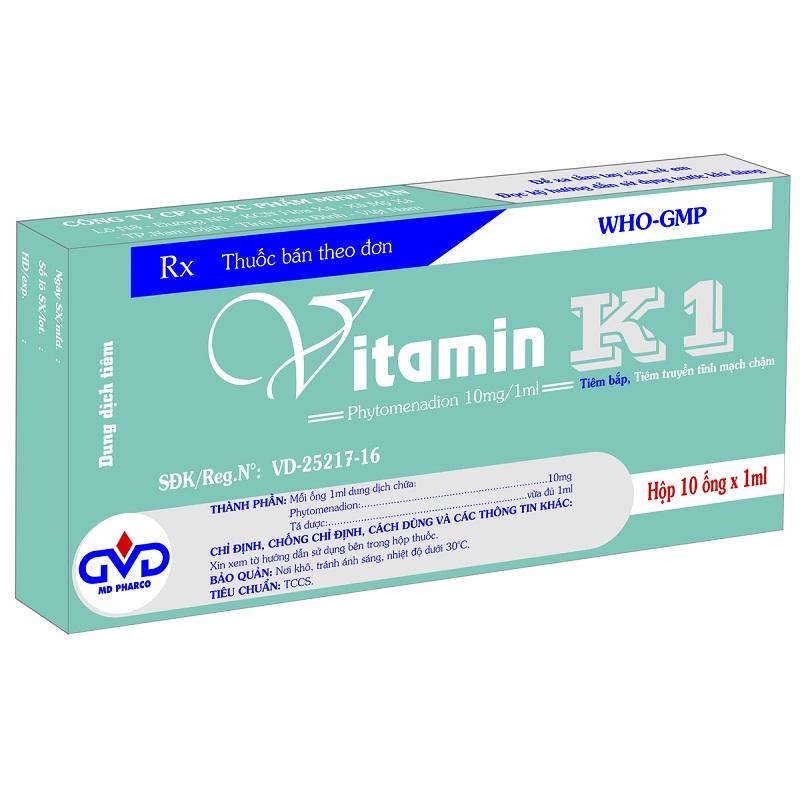Function
Normally, bowel bacteria is synthesized with vitamin K. Prevention is recommended for infants at a dose of 1 mg vitamin K1 (phytomenadion) immediately after birth.
In case of moderate vitamin K deficiency due to poor absorption, bile secretion, or antibiotics, it is recommended to take 10-20 mg / day.
In case of severe vitamin K deficiency due to occlusion or hemorrhage, vitamin K1 should be injected at doses of 10-20 mg / day.
When bile is blocked, vitamin K is not well absorbed, so the concentration of vitamin K-dependent coagulation factors will decrease (factors II, VII, IX and X), causing bleeding.
When administered intravenously too rapidly, vitamin K can cause flushing, sweating, bronchospasm, rapid heart rate and hypotension.
Vitamin K is an important component of the synthetic liver enzyme system that combines coagulation factors such as prothrombin (factor II), elements VII, IX and X, and proteins C and protein S. coumarin-type anticoagulant, vitamin K is released from the enzyme, reducing the production of clotting factors. As this is a competitive alternative, high levels of vitamin K can restore the production of clotting factors. Vitamin K1 is therefore an antidote to warfarin or coumarin overdose.
Point
Bleeding and increased risk of bleeding due to hypoprothrombinemia.
Hemorrhage due to the treatment of coumarin.
Decrease vitamin K in case of cholestasis, liver disease, intestinal disease or after long-term treatment with broad spectrum antibiotics, sulfonamides or derivatives of salicylic acid.
Contraindications
Patients with hypersensitivity to phytomenadione or any component of the drug.
Intramuscular injection should be avoided in cases of high bleeding risk.
Careful
Phytomenadione can cause haemolysis in people with a genetic defect that is deficient in glucose-6-phosphate dehydrogenase.
Taking high doses for people with severe liver disease may impair further liver function.
The dose for infants should not exceed 5 mg in the early days of birth, as the immature liver enzyme system.
Polyethoxy castor oil found in phytomenadione injection can cause severe anaphylactic reaction. This oil, when used for several days, can also produce abnormal lipoproteins, altering the viscosity of the blood and making red blood cells.
In severe haemorrhage, total blood transfusions or transfusions of blood are required.
Pregnancy period
Phytomenadion through the placenta little.
Phytomenadione is not toxic at doses less than 20 mg.
Therefore, phytomenadione is the drug of choice for reducing prothrombinemia in the mother and preventing neonatal hemorrhage (BXHSS). Vitamin K supplements are not needed unless there is a risk of vitamin K deficiency. A daily diet menu should contain 45 micrograms of phytomenadione.
Lactation period
Phytomenadione levels in breast milk are low. Most milk samples contain less than 20 nanograms per milliliter, many samples less than 5 nanograms per milliliter.
Although not all, many infants lack vitamin K because of the low vitamin K that they pass through the placenta. Breastfeeding alone will not prevent further loss of this low-potent vitamin K and may develop into vitamin K deficiency for 48 to 72 hours.
Mothers taking certain medications such as anticonvulsants, warfarin, or anti-TB medications can cause typical and early BXHSS, whereas breastfeeding is generally considered a cause of late and late BXHSS. The use of phytomenadione for infants prevents BXHSS by preventing factors II, VII, IX and X from continuing to decline.
In conclusion, low levels of vitamin K in breast milk do not protect the newborn from vitamin K deficiency, leading to hemorrhage. Vitamin K may be given to the mother to increase concentration in the milk, but additional research is needed. All infants should be given 0.5 - 1.0 mg of phytomenadione for prevention. Larger doses may be required or repeat administration should be given to the child if anticonvulsants or anticoagulants are used.
Side effects and management
Unexplained side effects.
Drinking may cause gastrointestinal discomfort, including nausea and vomiting.
Injections, especially intravenous fluids, can cause hot flashes, sweating, hypotension, dizziness, weakness, dizziness, cyanosis, anaphylactoid reactions, allergic reactions, altered taste. Doses greater than 25 mg can cause hyperbilirubinemia in neonates or premature infants. Intravenous injection can also cause severe anaphylactic reactions (even in patients who have never taken it), leading to shock, cardiac arrest, respiratory arrest and death.
Phytomenadion causes irritation of the skin and respiratory tract. The drug is blistering.
Rare: Skin reaction in place.
Should be intramuscular or subcutaneous. If required intravenously, dilute the drug with 0.9% sodium chloride solution or 5% dextrose solution and then intravenous infusion very slowly, not more than 1 mg / minute; The drug can be injected into the lower part of the infusion set of 0.9% sodium chloride solution or 5% dextrose solution.
When the anaphylactic reaction occurs, 0.5 - 1 ml of epinephrine solution should be administered intramuscularly 0.1% immediately, followed by intravenous glucocorticoid. Additional blood transfusions may be provided.
Routine prothrombin time should be monitored regularly to adjust the dose, dose interval, and duration of treatment.
When treating patients with hepatic impairment, it is important to note that some phytomenadione preparations have glycolic acid.
Dosage and Administration
Bleeding or bleeding.
Administer 10-20 mg or 5-10 mg. A larger second dose may be used if no effect is seen within 8 to 12 hours. Generally, oral anticoagulants should not be used temporarily.
Heavy hemorrhage due to cholestasis or other causes: Slow intravenous injection (1 mg / min) 10 mg (to 20 mg) phytomenadion.
Gastrointestinal or intracranial hemorrhage, life-threatening: Transfusion of blood or fresh plasma with phytomenadion.
Hemorrhage or threatening bleeding in newborn infants and premature births.
Prevention: 0.5 - 1 mg (1/2 to 1 vial 1 mg), intramuscularly immediately after calving.
Treatment: 1 mg / kg (1 - 5 vials of 1 mg) / day, intramuscularly in 1-3 days (may be given to children in milk on Monday and Tuesday).
Acute oral anticoagulant poisoning.
Slow infusion of 10 to 20 mg phytomenadione, then drink. Regular monitoring (3 hours later) of prothrombin values until blood clotting returns to normal. If there is not enough response, continue to use. Intravenous administration of more than 40 mg of phytomenadione in 24 hours is not recommended. If the patient uses dicumarol anticoagulants during surgery, phytomenadione may lose anticoagulant effect. If thrombosis occurs while using phytomenadione, the anticoagulant treatment must be transferred to another physician, it must be clearly stated that the patient used phytomenadion.
Interactive
Dicumarol and other derivatives are effective against vitamin K. Antifreeze can reduce or no effect when used with vitamin K. Therefore, vitamin K can be used as an antidote to overdose.
With the reduction of blood prothrombin due to gentamicin and clindamycin, the patient does not respond to vitamin K intravenously.
Preservation
Phytomenadion should be protected from light and stored below 300C. The cryopreserved phytomenadione should not be stored cold. Do not use split injection or droplets.
Incompatibility
The injectable phytomenadione can be diluted in 0.9% sodium chloride or 5% glucose. Benzyl alcohol preservative for neonates. Use immediately after dilution and dispose of the diluted portion as well as the drug in the syringe not used.
Overdose and treatment
Phytomenadione may be resistant to transdermal propranolol suppressants, especially when administered with large doses of phytomenadione. If you have taken a relatively large dose of phytomenadione, you may need to take a slightly higher dose of prothrombin inhibitor than normal, or use a different mechanism of action such as sodium heparin.




